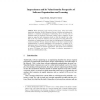Free Online Productivity Tools
i2Speak
i2Symbol
i2OCR
iTex2Img
iWeb2Print
iWeb2Shot
i2Type
iPdf2Split
iPdf2Merge
i2Bopomofo
i2Arabic
i2Style
i2Image
i2PDF
iLatex2Rtf
Sci2ools
107
click to vote
LSO
2004
Springer
2004
Springer
Impreciseness and Its Value from the Perspective of Software Organizations and Learning
When developing large software products many verbal and written interactions take place. In such interactions the use of abstract and uncertain expressions is considered advantageous. Traditionally, this is not the case for statements which are imprecise in the sense of being vague or subjective. In this paper we argue that such statements should not only be tolerated but, often, be very useful in interaction. For this purpose we relate abstraction, uncertainty and impreciseness to each other by investigating the differences and common properties. We also discuss the relation to the use of common sense
Large Software Products | LSO 2004 | Software Engineering | Uncertain Expressions | Written Interactions |
| Added | 02 Jul 2010 |
| Updated | 02 Jul 2010 |
| Type | Conference |
| Year | 2004 |
| Where | LSO |
| Authors | Grigori Melnik, Michael M. Richter |
Comments (0)

